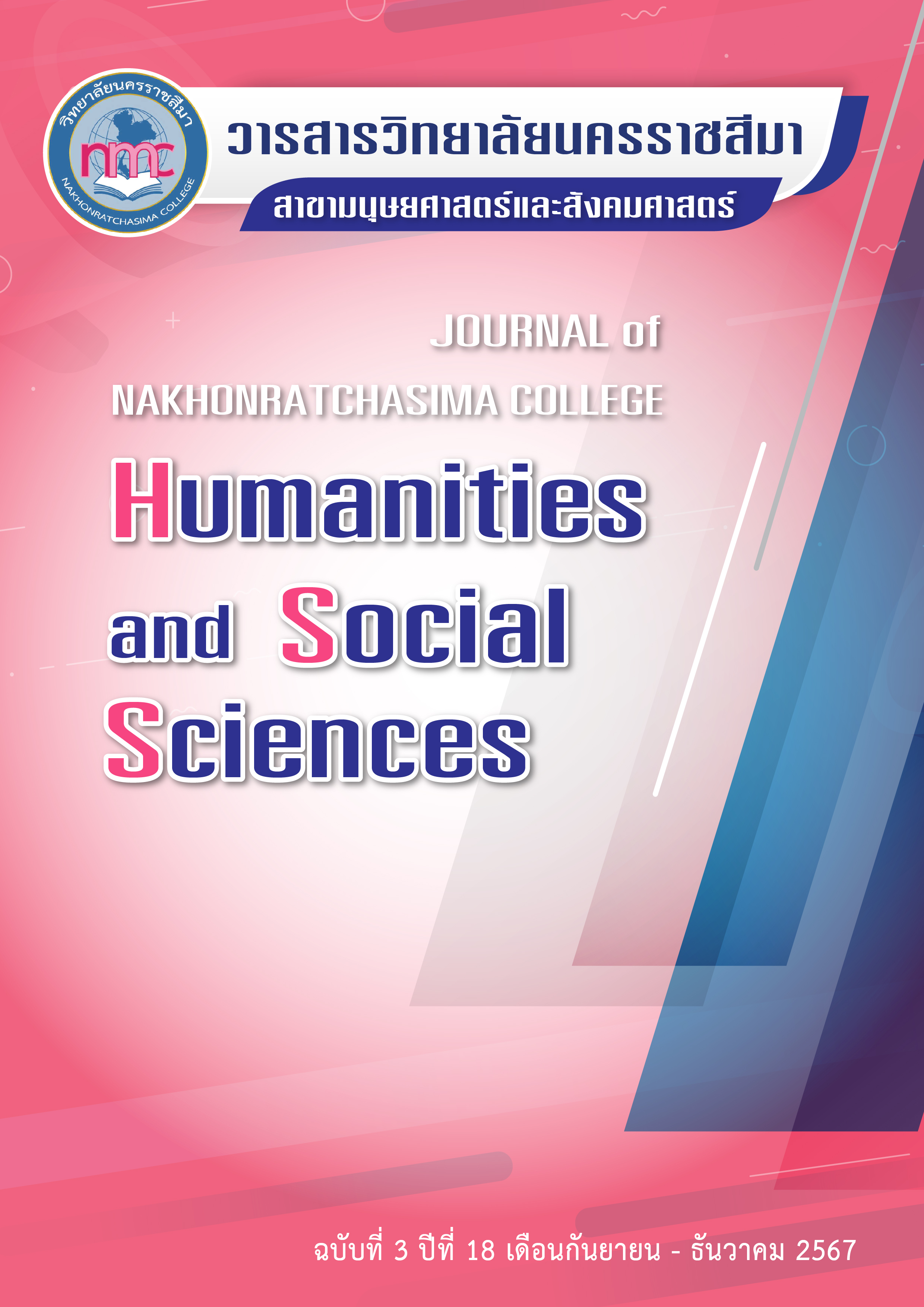Prevalence and Influencing Factors of Internet Addiction among University Students in China
คำสำคัญ:
Influencing Factors, Internet Addiction, University Studentsบทคัดย่อ
This article aimed to explore the influencing factors of university students' Internet addiction and to promote university students to use the Internet scientifically and reasonably. In this study, qualitative research was conducted first. A total of 20 subjects were interviewed face-to-face. Based on the results of the qualitative study, a questionnaire was designed. After that, 419 data were collected and the SEM method was used to evaluate and confirm the results. The results showed that negative emotions played a partial mediating role between stressful life events and Internet addiction. Coping style had a moderating effect on the relationship between stressful life events and negative emotions in the mediation model, and also had a moderating effect on the relationship between negative emotions and Internet addiction, and also had a moderating effect on the relationship between stressful life events and Internet addiction. Self-control played a partial mediating role between the influence of others and Internet addiction. Therefore, it also recommended among others that university students, university educators, social institutions and governments should pay more attention to Internet addiction, effectively prevent them from using the Internet too much, so as to provide guidance for university students to improve the quality of Internet life and mental health.
เอกสารอ้างอิง
Bai Yu, Fan Fumin.(2005). Revision and application of Internet dependence measurement tools for college students. Psychological Development and Education, (04),99-104. doi:CNKI:SUN:XLFZ.0.2005-04-018.
Kawabe, K., Horiuchi, F., Ochi, M., Oka, Y., & Ueno, S. I. (2016). Internet addiction: Prevalence and relation with mental states in adolescents. Psychiatry and clinical neurosciences, 70(9), 405-412.
Ko, C. H., Yen, J. Y., Liu, S. C., Huang, C. F., Yen, C. F. (2009). The associations between aggressive behaviors and internet addiction and online activities in adolescents. The Journal of adolescent health : official publication of the Society for Adolescent Medicine, 44(6), 598–605. https://doi.org/10.1016/j.jadohealth.2008.11.011.
Lei Li, Yang Yang. (2007). Development and verification of adolescent Pathological Internet Use Scale. Acta Psychologica Sinica, (04),688-696. Doi: CNKI: SUN: XLXB.0.2007-04-016.
Li BoRan, Xiong Ruoyu, Peng Peng, Jia Liping, and Lu Guohua.(2022). The influence of stressful life events on Internet addiction in adolescents: a moderated mediation model. Chinese journal of health psychology, (07), 1087-1092. Doi: 10.13342 / j.carol carroll nki CJHP. 2022.07.026.
Li Chaomin. (2012). The college students' Internet addiction causes and prevention and cure method system research (Ph.D. Thesis, central south university). https://kns.cnki.net/KCMS/detail/detail.aspx?dbname=CDFD1214&filename=1012474973.nh.
Li, Y. Y., Sun, Y., Meng, S. Q., Bao, Y. P., Cheng, J. L., Chang, X. W., ... & Shi, J. (2021).
Internet addiction increases in the general population during COVID‐19: Evidence from China. The American journal on addictions, 30(4), 389-397.
Liu Lu, Zhao LianHui, Song ChanXu, Yu Haoqing, Zhang Shuo, Xiao Han & Yan Nan. (2023). A survey on the relationship between Internet addiction and self-control among college students. Journal of Shenyang Medical College, (05),475-478. doi:10.16753/j.cnki.1008-2344.2023.05.006.
Ndasauka, Y., Pitafi, A., & Kayange, G. M. (2019). Psychometric properties of Young's internet Addiction Test (IAT) in Urdu language. Asian journal of Psychiatry, 40, 39-44.
Ren Xinyu. (2017). The influence of college students' peer relationship on Internet addiction: the mediating effect of core self-evaluation. Psychological techniques and applications, (09), 521-529. The doi: 10.16842 / j.carol carroll nki issn2095-5588.2017.09.002.
Shao, YJ., Zheng, T., Wang, Yq. et al. (2018).Internet addiction detection rate among college students in the People’s Republic of China: a meta-analysis. Child Adolesc Psychiatry Ment Health 12, 25. https://doi.org/10.1186/s13034-018-0231-6.
Shaw, M., & Black, D. W. (2008). Internet addiction: definition, assessment, epidemiology and clinical management. CNS drugs, 22, 353-365.
Sun Jing, Li Yan, Pan Deng, Zhang Jianrui, Hu Qiaoyun, Li Hao.(2009). Relationship between Internet addiction and coping styles and emotional disorders in college students. Chinese Journal of Public Health, (09),1041-1042. doi:CNKI:SUN:ZGGW.0.2009-09-013.
Tateno, M., Teo, A. R., Ukai, W., Kanazawa, J., Katsuki, R., Kubo, H., & Kato, T. A. (2019). Internet addiction, smartphone addiction, and hikikomori trait in Japanese young adult: Social isolation and social network. Frontiers in psychiatry, 10, 455.
Wang Jun, Li Dianxia.(2016). Research on the relationship between Internet addiction, coping style, loneliness and self-esteem of college students. Journal of Anhui University of Technology (Social Sciences Edition)(01),96-98+103. doi:CNKI:SUN:AHSK.0.2016-01-033.
Wang Yan, Chen Jing, Lei Wei & Zhang Tao. (2018). The impact of Internet addiction and sleep quality on negative emotions among college students during summer vacation. Sichuan Mental Health, (01),51-56. Doi: CNKI :SUN:WANT.0.2018-01-013.
Wang Zhengyi (2020). College students stress life events and anxiety and the relationship between Internet addiction research (a master's degree thesis, university of the Yangtze river). https://kns.cnki.net/KCMS/detail/detail.aspxdbname=CMFD202101&filename=1020085190.nh.
Xiao Yiling.(2019). The influence of life events on Internet addiction among college students: the mediating effect of coping styles. Farm Staff Officer, (01),172-173. doi:CNKI:SUN:NJCM.0.2019-01-158.
Xie Xiaojuan & Liu Liwei.(2022). The influencing factors of Internet addiction disorder among college students. Chinese Journal of Coal Industry Medicine, (05),547-552. doi:CNKI:SUN:ZMGY.0.2022-05-022.
Yamane, T. (1973). Statistics: An Introductory Analysis. (3rd Edition). Harper & Row Ltd., New York.
Yan Qiong, Yang Yanting, Qi Yue, Qi Wenjuan, Yang Dongling & Luo Chunyan.(2022). The change trend of Internet addiction among adolescents in Shanghai from 2004 to 2019. Chinese School Health, (08),1193-1197. doi:10.16835/j.cnki.1000-9817.2022.08.017.
Zhang Yawen, Wang Yi, Qu Wen, Li Na, Chang Zhicheng , Dong Man.(2020). The relationship between short video and Internet addiction and personality traits of college students. Chinese journal of health psychology, (09), 1418-1422. The doi: 10.13342 / j.carol carroll nki CJHP. 2020.09.031.
Zhou Qian. (2021). The college students' pressure events, time management and study on the relationship between the Internet addiction tendency. (a master's degree thesis, central south university for nationalities). https://kns.cnki.net/KCMS/detail/detail.aspx?dbname=CMFD202301&filename=1021700266.nh.
ดาวน์โหลด
เผยแพร่แล้ว
รูปแบบการอ้างอิง
ฉบับ
ประเภทบทความ
สัญญาอนุญาต
จรรยาบรรณผู้เขียนบทความ
ผู้เขียนบทความต้องรับรองว่าบทความนี้ไม่เคยตีพิมพ์ในวารสารใดหรือสิ่งพิมพ์อื่นๆ มาก่อน ต้องไม่คัดลอกผลงานผู้อื่นมาปรับแต่งเป็นบทความของตน และไม่ได้อยู่ระหว่างการเสนอเพื่อพิจารณาตีพิมพ์ อีกทั้งยอมรับหลักเกณฑ์การพิจารณาและการตรวจแก้ไขบทความต้นฉบับโดยกองบรรณาธิการวารสารวิทยาลัยนครราชสีมา สาขามนุษยศาสตร์และสังคมศาสตร์
บทความทุกเรื่องได้รับการตรวจพิจารณาทางวิชาการโดยผู้ทรงคุณวุฒิที่มีประสบการณ์และมีความเชี่ยวชาญตรงตามสาขาของบทความ ซึ่งผู้เขียนต้องแก้ไขตามคำแนะนำของผู้ทรงคุณวุฒิภายในระยะเวลาที่กำหนด หากไม่เป็นไปตามกำหนดกองบรรณาธิการขอสงวนสิทธิ์และยกเลิกการตีพิมพ์โดยจะแจ้งให้ทราบต่อไป
ข้อความที่ปรากฏในบทความของวารสารนี้เป็นความคิดเห็นของผู้เขียนซึ่งไม่เกี่ยวข้องกับวิทยาลัยนครราชสีมาแต่อย่างใด และกองบรรณาธิการขอสงวนสิทธิ์ในการพิจารณาและตรวจประเมินบทความเพื่อตีพิมพ์ในวารสารของวิทยาลัยนครราชสีมา สาขามนุษยศาสตร์และสังคมศาสตร์



